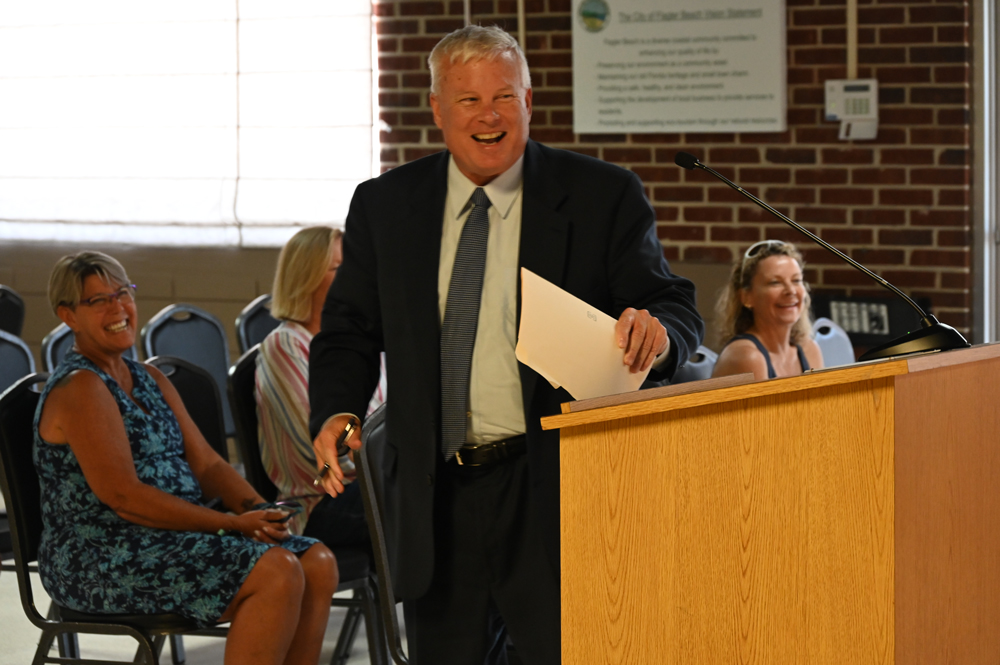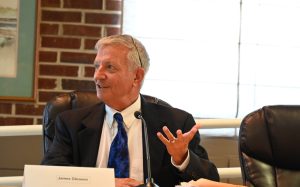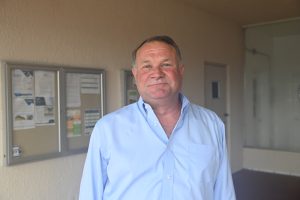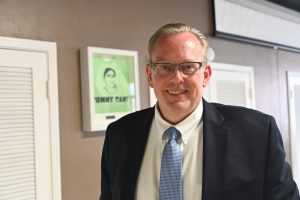
Saturday update: Dale Martin has accepted the job, according to City Commissioner Scott Spradley. “I reached out to Dale Martin to congratulate him on being offered the Flagler Beach City Manager position. He replied that he is very excited to come to Flagler Beach and will begin his transition and contract negotiations shortly,” Spradley wwrote this morning. “I feel this is an awesome step forward for Flagler Beach. Dale’s significant experience in Fernandina Beach with coastal community hurricane recovery efforts and with his successful track record with FEMA are but two strengths in his background that will benefit Flagler Beach. I am very excited for our community to have Dale on board.”
Marti will be attending next week’s daylong commission budget workshops.
![]()
The Flagler Beach City Commission today voted to hire Dale Martin, the city manager in Fernandina Beach for seven years until last March, as its next city manager. If each commissioner could vote twice for him, that’s what would have happened: he was that acclaimed.
As he was by the public. “You guys know what to do,” Scott Crone, one of the six members of the public who stuck out the entirety of the interviews told the commission at the end of the afternoon, just before the vote and before the commissioners had a tally of their straw poll. He did not even mention Martin’s name.
Every one of the six members of the public who spoke pressed for Martin. The commission echoed that consensus: it was unanimous among commissioners–Chairman Eric Cooley, Commissioners Jane Mealy, Rick Belhumeur, James Sherman and Scott Spradley, along with Mayor Suzie Johnston.
Even city staff was jubilant:
There was little question that by the time the four interviews were over, if not a bit earlier, Martin was by far and away the strongest candidate–and the most favored by the commission. He seemed to combine the strong will of Larry Newsom, the late manager who reigned for five years before his untimely death, minus Newsom’s crustiness but with the varied and grounded professionalism of Mike Abels, the city’s current interim manager.
Martin would likely bring something to the commission that it hasn’t experienced in many years: a more assertive, less pliant personality that would not hesitate to draw a sharper line separating its operational from the commission’s policy sphere. Previous managers have tended to let that line get blurred from time to time.
The deference to commissioners is a double-edged sword, leaving commissioners more vulnerable to criticism over issues that are more directly the manager’s responsibility. This current commission, most of its members having demanding jobs away from government, is inclined to embrace that more assertive approach, being as close to a continuation of the Ables months as they could get.
Martin has ample coastal-city experience only a few dozen miles up the road, and seemed prepared to take on the city’s reins, its budget and the management of its 106 employees without much of a learning curve, and with little of the baggage some of the other candidates brought with their candidacy.
Based on what he told the commission, he would likely be on the job by the middle of August, in time to have an imprint on the budget, which the commission approves in September.
In case things fal through with Martin, the commission voted for Jim Gleason as its second choice.
All four of the candidates met with commissioners one-on-one, behind closed doors, this morning (in individual interviews). The public session began at 1:30 p.m., with each candidate interviewed in roughly half-hour increments. Here’s a run-down of each interview.
Dale Martin was first up. Born and raised in Michigan, he served four communities there before moving to Connecticut “before learning to love Florida,” where he served until March this year as city manager in Fernandina Beach. “I’ve come to enjoy the Florida coastal life. I think that’s where my skill set is involved,” he said.
He had a couple of sheets of paper in front of him but did not refer to them and spoke without notes, his eyes trained on the commissioners the whole time, his body slightly hunched forward, unmoving. He looked comfortable, resting his shoulders on the desk, his hands clasped, letting his answers rather than his body language spoke of his assertiveness. He left no doubt about his self-assurance. His answers were unhesitating, at times a tad brisk, at times repeating what he’d written in his application package. He was short on humor and small talk, long on his achievements as a manager. He is closer to a cyborg than a softie.
“What scares you about taking the job in Flagler Beach?” Belhumeur asked him.
“Absolutely nothing,” he said. “I was a former military officer. the decisions I can make as a military officer could kill people. The worst we’re going to have here is flooding, drowning or fire and you will be notified the instant I am of any of those instances.”
Spradley asked him why, of all places where he could go, he is choosing Flagler Beach. He described Flagler Beach as “quirky,” saying the description was “meant lovingly.”
“So are you quirky as well?” Cooley asked him, perhaps looking for a little breach of quirkiness in a rather Nordic personality.
“I’m sure I’m described that way by some,” Martin said. But if he’d not necessarily won the commission’s affection, he’d won its regard.
“When can you start?” Belhumeur asked him before Cooley stopped Belhumeur, saying: “That’s almost a job offer.” Still, Martin said he could start within a month.
Among his accomplishments, he won a five-year battle with FEMA, including arbitration, giving the city $7.5 million instead of a fraction that FEMA wanted to pay initially. His tenure included beach renourishment projects by the U.S. Army Corps of Engineers. He navigated Fernandina Beach through Hurricanes Matthew and Irma, a mirror of the Flagler Beach experience. He implemented a new stormwater program for the city and developed a stormwater master plan in the last five years. “That’s been a great success,” he said, likely aware that Flagler Beach residents in some neighborhoods have been complaining of faltering stormwater service.
His critics, he said, might say that “I tended to favor some commissioners more than others.” Then he explained, after Mealy asked him how he’d address different commissioners’ interests: “I have to draw a distinction between commissioner priorities and commission priorities. I might be able to do small things on your behalf, but there comes a time when I’ve gone as far as I can and I need to get the entirety of the City Commission to approve further action on this project or this policy.”
But when he is asked for information by one commissioner, he responds electronically with the answer to all commissioners.
Work-method-wise, he tracks projects with a whiteboard in his office. “I have my list. I know some of you have your list.” He described himself as a generalist who relies on his department directors. “There’s no spring training for city management,” he said. “I look forward to these challenges.”
He summed up the city’s challenges from the public’s perspective as “stormwater and maintaining the character and quality like the heavier Flagler Beach.” He added: “I look forward to serving you and the residents of this city, first and foremost.”
He was not unduly flattering, servile or fawning about the commissioners or the city, but professional from start to finish. He did not lecture the commissioners or evade questions to answer with his own talking points, sticking to the questions he was asked.

James Gleason was next. When he sat down Cooley told him he was sitting in the chair he’d use as the manager, to which Gleason had a curious joke of a reply: “At least there’s a buffer, the attorney’s between us,” he said, pointing to the chair usually filled by Drew Smith, the city attorney. Gleason is no stranger to litigation: one of his previous cities had to settle a discrimination lawsuit filed by a Black employee who accused Gleason of racism.
Like Martin, he spoke without notes, but unlike Martin, he spoke with his hands a great deal. He was a lot more folksy than Martin, but also more discursive, going off on so many tangents and speaking at such lengths, one line of thought leading to another, as to suggest that his managerial style might not be that focused, either. He was eager, over-eager, to speak and keep speaking, his enthusiasm in moments sounding like that of a preacher–as when he pointed to the picture of the pier in the room to say the obvious: “That’s your identity.”
While Martin had described himself as “a generalist” as a philosophy, delving immediately into specifics, Gleason spoke in generalities that often stayed there. Even though he’s had a long career, he did not draw on examples from that career to illustrate his points. He just made points that sounded good, but that did not necessarily attach to actual experiences, or say much more than a string of slogans: “It is critical that communication goes both ways. Internally, totally open and transparent, open door, staff meetings, don’t meet people to death but let’s find out what’s going on, what we have this week, where we’re going and then let’s recap, you know, what got accomplished and where we’re at.”
He described a career that included city management and a year’s stint as a trainer of Iraqi officials in management and budgeting (“you can see we did a good job,” he said wryly.) He last worked in Littleton, N.H., “beautiful” but cold, he said. Plus, he’s a Floridian.
Gleason sounded more authentic when Sherman narrowed him down to specifics on a discussion of the budget. Gleason and Sherman had talked about finances in their one-on-one interview earlier in the day. Sherman asked him how he brought a previous city out of near-bankruptcy.
Gleason said he got a “very austere” plan in place that “streamlined the staff that was there,” and went to the biggest possible tax rate to get out of the deficit. The city had the highest tax rate in Lake County, but the city got debt-free by August 2017, eliminating the $6 million debt. He said in Littleton, his last stint, reserves had been very low, and are now above $1 million.
“Some of that is luck, but some of it is managing and keeping a tight handle on what needs to be done.
The downside of the commissioners holding closed-door meetings with the candidates was obvious in Gleason’s case: if his career were the shape of a room, the elephant in that room are his cases of controversial conduct, including a verbal and physical confrontation caught on video, and the discrimination lawsuit.
If commissioners asked him about that past in the closed-door meetings, they did not ask him about it in the open session, essentially denying the public a chance to hear Gleason explain himself openly on what remains disturbing counterpoints in an otherwise solid career. But that spoke more to the commissioners’ blind spot than to Gleason’s transparency (of which he boasted).
He was asked about economic development, grants, community redevelopment, infrastructure, stormwater and wastewater, and whether he’d have any reluctance about taking on a job with “that level of chaos,” as Spradley put it to him.
“No reluctance at all,” he said, again repeating what he’d said earlier in the interview–that he wasn’t here to retire. When asked if he had any questions of the commissioners, he asked them what their expectations were of the city manager. “Competent multi-tasker” was one answer, which two commissioners gave. “I want you to be boring,” Cooley told them. “Boring has no surprises. It’s predictable, and it’s smooth.” Transparency, assertiveness and communications were other answers.
But it was telling that commissioners did not ask him when he could start, as they had Martin–he asked them, and said he’d need to have time for a 30-day notice.

Todd Michaels summarized his career by beginning at the end, explaining what led him to retire after 23 seemingly spotless years in Greendale, Wisconsin, where he was broadly admired, then explaining what led him away from retirement: He was getting bored.
He sat back in his chair, wearing an open-collared shirt but speaking as if edged with a nervousness that made him sound a tad out of breath. He repeatedly clasped his hands, put them on his lap, held them at chest-level: his hands seemed bored, too.
The dynamic between Michaels and commissioners wasn’t immediately apparent though, as it had been in Martin’s case and in Gleason’s case. The commissioners asked their questions, but the answers did not elicit more than polite nods. But he was the most humble of the candidates until then, his personality effaced behind his experience rather than driving it. “Normally don’t say I, say ‘we,’” he said.
He could be funny, as when he described FEMA coming through likely because it was an election year (Wisconsin is a perennial swing state), or when he described his disagreeable experiences with airports. He was certainly candid, as when he described himself as “disappointed at the infrastructure,” with badly planned subdivisions. He did not blame the current commission.
He said he was looking forward to big challenges–the rebuilding of the pier especially. He sought to dispel the idea that his Midwestern years kept him safe from big weather events, including flooding: “When I was manager, I literally wading through the streets,” he said of torrential rains that flooded the first floor of a number of buildings in 2008 and 2010.
He spoke about communication and transparency. “There’s certainly nothing to hide, I’ve operated my entire life as if you have to be prepared to explain it to 150 to 100 people, and I’ve done it,” he said, describing a “misstep” involving a revitalization project downtown that looked to site some affordable housing there, or what was interpreted as affordable housing.
“The irony is, it was in the village center area which is a historic workforce housing project,” Michaklesl said, “and it would have been a nice, new development.” But he and the city had to backtrack in face of the opposition–opposition mobilized by a person he described as his best friend.
Mayor Suzie Johnbston asked him how he’d get address the communications breakdown that had been a recurring issue between residents and the previous manager. Michaels said he’d return calls, use the website–and criticized the narrowness of the city’s website. “I’ve never had trouble communicating with anybody,” he said. He keeps lists of his communications to keep everyone on the same page. “You’ve got to make sure that everybody has the same information and you’re not playing favorites,” he said.
Asked if he had any questions of commissioners, Michaels replied: “I know I’m supposed to, but no,” he said, explaining that he’s been here since Monday, doing his research. He said he was not pressured by the need for a job: he just wanted the challenge.

David Williams was last–a less assertive Martin, equally professional, more affable, his energy level more tempered than some of his predecessors.
He’d been the town administrator in Sherborn, Mass., one of the wealthier towns in the country that he described as a town of “gentlemen farmers” and a “face to face community of running everything.” He ran most top town offices. “There were a lot of different hats that the time I was there, they kept passing bylaws and giving [me] additional titles,” he said.
When he showed pictures of Flagler Beach to his family, “they were packing,” he said (not guns). He seemed eager to abandon the New England town-meeting type of government. “The New England town meeting form of government, it’s exhausting,” he said, “when you’re meeting 14 nights in a row to get something passed.” The meetings in Flagler Beach are not that frequent, but the commission chairman cautioned him that he may not get much of a break here, either.
The mayor asked him what he’d do to preserve the city’s character. His answers went from the general to the precise. “I would like to go through the community and see what is good growth, what’s bad growth,” he said. “Some towns like older buildings, and they want that coastal feel of, you know, fishing villages type things. But other places, they want to get away from that and they just want a Starbucks” or that sort of business. He suggested the mainland could offer places like that, and that working with developers could steer the right developments in the right places.
“So the hotel project is exciting,” he said of the planned 100-room hotel for downtown. “But it seems like it’s kind of split among people whether it’s positive growth or not. And we really won’t know for sure until it’s actually there.”
As for communications and transparency, which Belhumeur described as “problematic hare,” Williams said he’d redevelop the website (with a state grant), he’d avoid miscommunications “before they get out of hand. You use technology, you use writing and paper, you put videos up,” he said, citing his experience with a government channel.
“The thing is, not everybody wants to know.” Williams said. “Some people want to just go about their lives so they don’t want to be bothered or think that the manager is writing, he’s doing a major presentation every week or something. That’s time that should be spent on something else.”
Unlike Michaels, Williams initially said he wrote down 10 pages’ worth of questions, though he posed many of them during his tour of the city, speaking with division heads and others. “I want to get into the financial books, and that’s not something that I usually approach a community with,” he said.
He asked how the commission would judge the first year as a success–a question none of the other candidates had asked. The mayor said she wants to see a true project tracker, available visibly on the website for all residents to see. “That would be a giant leap in communications for our residents,” she said. Sherman said he wants the manager to tell the commission what ought to be the priorities.





























Ronald Justice says
City staff was jubilant? (After 3rd paragraph) Please explain.What city staff member was present and jubilant? Were they allowed to vote? I think not. Commissioners are not city staff they are elected officials voted in and not 1 city staff member was present except the city clerk; did she vote? i think not; wasn’t allowed too. Only 6 citizens out of over 5,000 residents were there. So once again city staff was jubilant? Please explain or are my wife and i missing something?
FlaglerLive says
The city clerk, who was present and spoke for city staff, represented that opinion.
Jimbo99 says
Hope he lasts longer than his predecessors. The heavy lifting has been done as far as the pier rebuild being in place goes. Future storm damages to dunes & A1A certainly will affect any City Manager’s career going forward. He inherits the Hotel & upgrades to SR-100 street & pedestrian traffic amenities. The swales are going to be the flooding issue devoid of Hurricane & Tropical Storm activity. He’s far enough removed from a pandemic economy.
As I pointed out in a prior article, Fernandina Beach is a little different than Flagler Beach. Where the pier is the town’s image & main draw, Fernandina has Center Street & the marina there. Flagler Beach has little to no industry. Fernandina has a small port & rail system to the island, Westrock & Ryam & Fort Clinch, not to mention the Amelia Island draw for the Amelia Concours d’Elegance for the exotic car show. Used to have the Bausch & Lomb Tennis Tournament. SR-200/A1A is a little further back from the Ocean there, they call it Fletcher Ave. And over the past 7 years, Fernandina Beach has never been the relative epicenter of a Hurricane like Flagler Beach was for 2016 & 2017. Those 2 Hurricanes hit Jacksonville harder than it did Amelia Island area.
In a way I liked the approach the Williams has, the financial books are going to make or break the City Manager in Flagler Beach. How long does the honeymoon last really. Flagler Beach may be relatively limping for financing until the new pier is done ?
Concerned Citizen says
A new City Manager is great and all but.
He won’t survive the current Mayor and cronies. You have a Mayor sleeping with a Commissioner. Who is also a bully and doesn’t know how to treat women. You have another who keeps getting re-elected and runs his own one sided code enforcement. When he’s not running over cyclists with his truck. Spradley seems the most solid but is new and untried. Jane Mealey is solid so I don’t see an issue there.So It’s unsure of how long he will last.
I give the new guy 6 months. Before he runs afoul of Belhumeur,or Cooley. Then it will be another witch hunt to get him out of here like all the rest.
Mr. Martin. Back ground checks and hiring investigations go both ways. I hope you have done your due diligence on the Flagler Beach Mayor and City Commission also. I would hate to see you unroot yourself and family. Just to have a quick turn around.
Tina D says
Yes investigations do go both ways! A more thorough one should have been done on this Dale Martin character. If we had known about this decision, we would have reached out to Flagler. We live in Ormond Beach and had wonderful neighbors who relocated to Fernandina Beach years ago. When their daughter’s fiance (engineer) traveled to Fernandina Beach from a different state to help her with her property earlier this year, his concerns about a permit led to setting up an appointment at City Hall. When he actually got there, Dale Martin saw to it that the engineer’s questions weren’t answered and called the police on him. Did the engineer do anything wrong? Absolutely not. Did Dale Martin have a rational reason for calling the police on a citizen who had an appointment to be there? No. The worst part of it is that no one at City Hall asked the engineer to leave. They just called the police on him while he was sitting there quietly and patiently to meet with the City Planner there. We know the daughter who owns the property in Fernandina Beach very well because she lived right here in Ormond Beach with her family for years. We can’t say enough good things about them- they are wonderful, upstanding people and we hated to see them go! Dale Martin calling the police on ANY citizen for expressing concerns and wanting answers to questions is an inexcusable act of a bully who deserved to be terminated as the Fernandina Beach City Manager. Beware Flagler Beach!
Jean says
@Tina – Yep, same experience! Fernandina is glad to pass the trash to Flagler!
Bethechange says
Can he write a grant? And if not, will he make certain he hands that task off to someone who can and in ample time to meet an application deadline? Just thinkin’ ahead here…